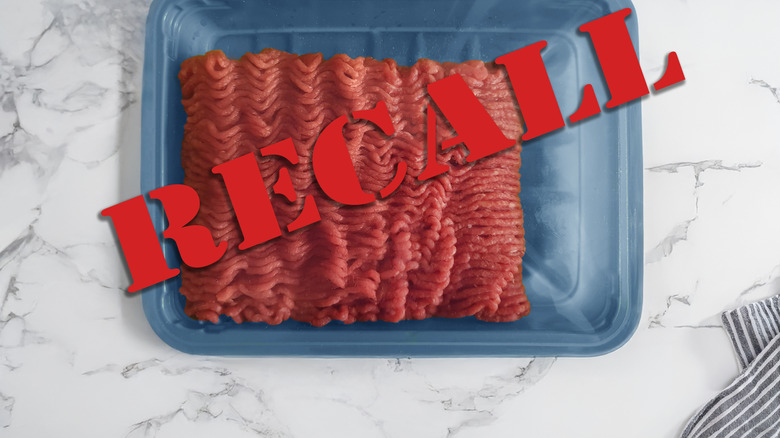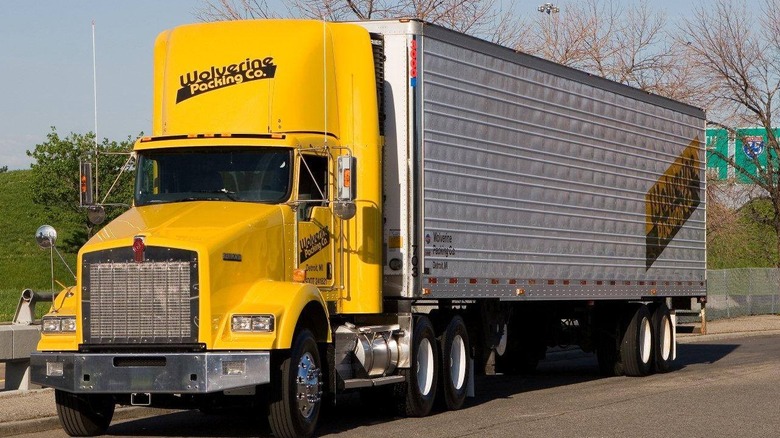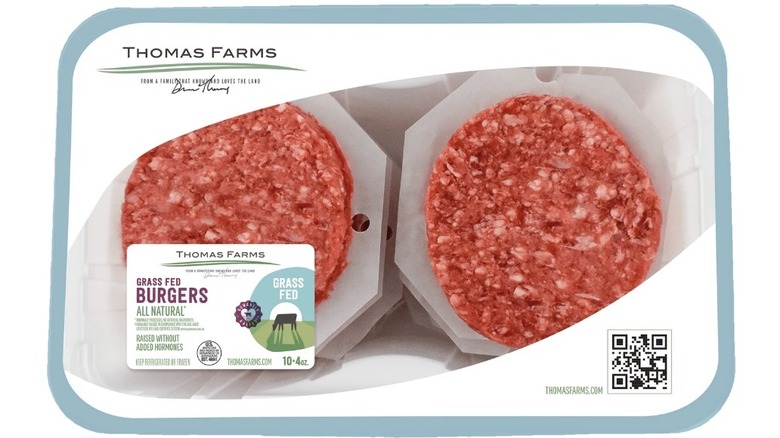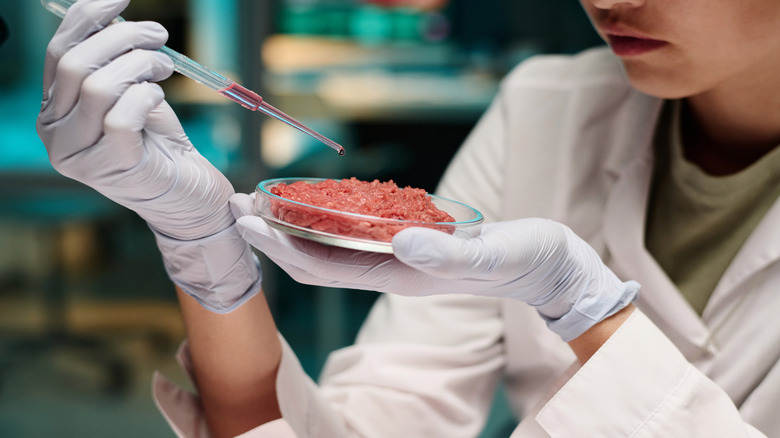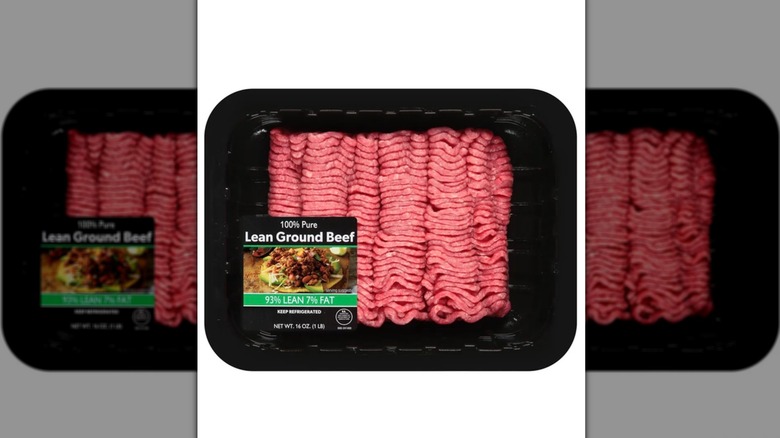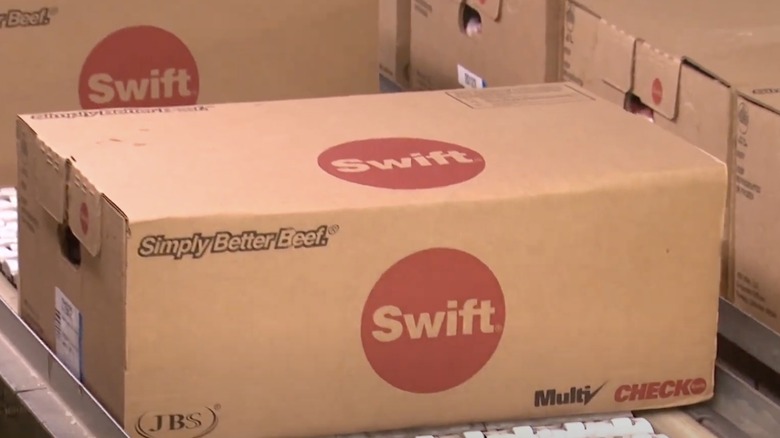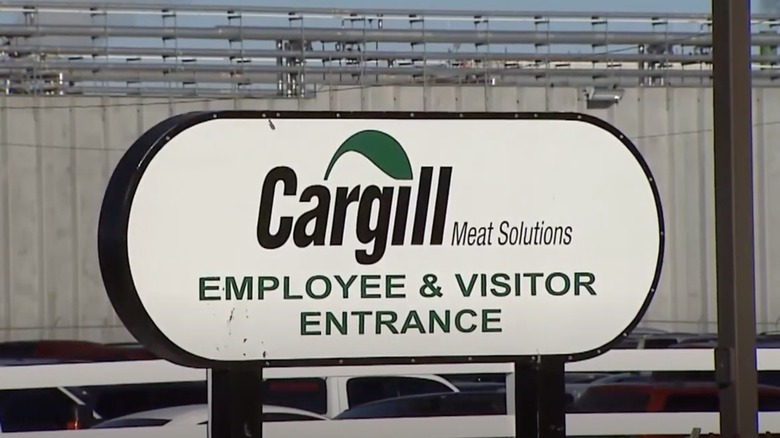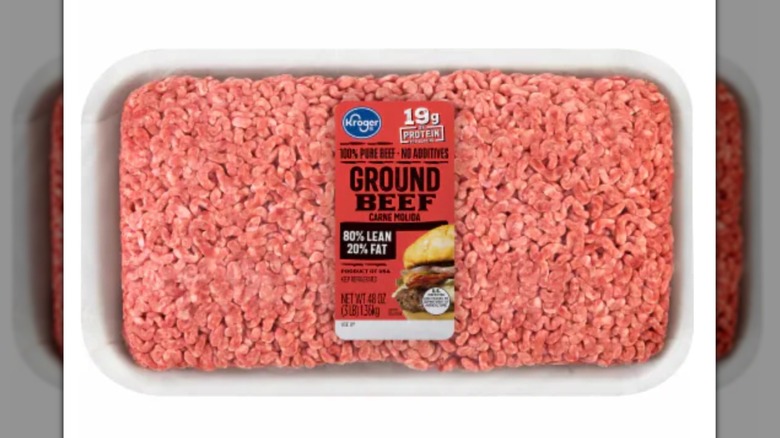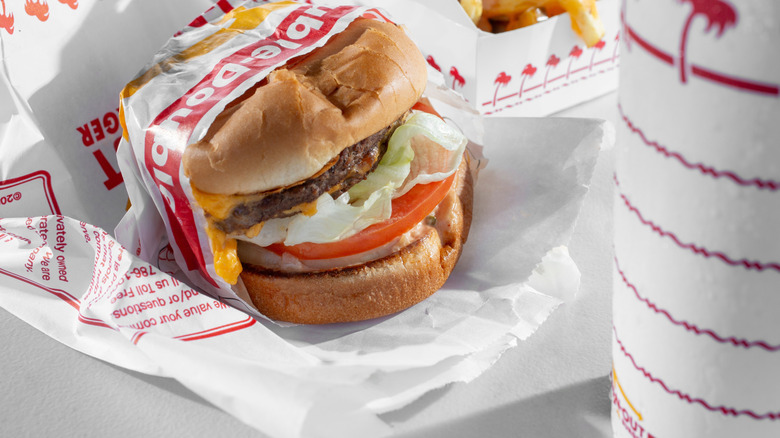10 Ground Beef Recalls That Swept The US
More than just the makings of hamburgers and the same old meatballs, ground beef's popularity with American diets also means recalls can be considerable — and sometimes dramatic. Even when the risk is low or the probability of a contamination remains suspect, the consequences of being wrong are exactly why the U.S Department of Agriculture's (USDA) Food Safety and Inspection Service errs on the side of caution while presenting details about the danger. Where beef is concerned, this often means emphasizing the risk presented such as by bacteria's like E. coli and salmonella.
Of course, sanitary practices and abiding by recommended internal cooking temperatures aren't nearly enough to stave off potential infections, especially when the worst outcomes could include kidney failure and even death. As such, local, state, and federal agencies have continued to evolve practices and regulations in response to ground beef recalls that, in some cases, set records exceeding tens of millions of pounds of product before landing meat packers in court. From cautionary tales with hospitalizations and death to fortunate cases caught before harm could occur, the following ground beef recalls impacted Americans across the country.
Wolverine Packing Co. (2024)
Out of the three possible class ratings the FSIS has for recalls, the November 2024 announcement centered on ground beef produced in Detroit, Michigan was undoubtedly a Class I. The reason for the highest degree of concern came with the Minnesota Departments of Agriculture and Health, together with a group of ill people, notifying the agency of a suspected link between their conditions and ground beef from Wolverine Packing Co.'s facility that ultimately tested positive for E. coli.
While there are various kinds of E. coli bacteria, the U.S. Centers for Disease Control and Prevention (CDC) highlights that not all will make people sick. The most concerning to the CDC and other health agencies are those that produce the shiga toxin which can cause hemolytic uremic syndrome (HUS), a condition that can lead to kidney failure and death. Notably, there was no threat distinction between the fresh and frozen products as lower temperatures would not make the 167,277 pounds of meat recalled any safer to consume. Rather, in line with the USDA's preference you prepare your burgers well done, only by cooking the ground beef to an internal temperature over 160 F could harmful bacteria be killed — though that would not account for spread to surfaces elsewhere in the kitchen.
Lakeside Refrigerated Services (2022)
Considering the risks present from consuming food contaminated with E. coli, it should come as no surprise that the mere possibility of tainted product is enough to justify a recall. Such was the case in April 2022 when ground beef produced at Lakeside Refrigerated Services' Swedesboro, New Jersey facility dating back to February of that year became subject to such measures. Routine testing by FSIS concluded that there was a chance that the meat — sold as patties and rollstock under brands like Nature's Reserve and Thomas Farms — had come in contact with a particular strain of E. coli, resulting in the recall of 120,873 pounds of ground beef.
Unlike these secret ingredients you'll want to try in your burgers, shiga toxin-producing E. coli (STEC) pose a grave risk to the public made worse as some strains are less readily detectable than others. Though not as likely to result in HUS as with STEC O157:H7, strains like STEC O103 can still cause severe harms, especially among children, the elderly, and anyone with weakened immune systems. That said, it is also harder to detect than the other strain, meaning laboratories don't often look for it when running surveillance tests.
K2D Foods (2019)
The investigative efforts of the CDC and the Tennessee Department of Health managed to trace an E. coli outbreak back to a facility in Carrolton, Georgia resulting in the April 2019 recall of 113,424 pounds of ground beef. Patients who took ill from contact with the bacteria had shared a unique dining location in common. Armed with that knowledge, investigators tested an unopened package of meat from the same restaurant and received a positive test result for E. coli O103.
The health agencies asserted the result was not enough to affirm the product was the source of the outbreak as illnesses may not manifest for four to five weeks after exposure. However, it was certainly enough for the K2D Foods operation under the Colorado Premium Foods banner to recall the nearly 57 tons of ground beef that had been shipped to distributors in Florida and Georgia. Despite the severity of the risk, FSIS indicated that only 13,872 pounds of ground beef had been recovered as part of the recall.
JBS Tolleson, Inc. (2018)
Before expanding a recall to more than 12 million pounds of ground beef, JBS Tolleson, Inc. out of Tolleson, Arizona was already dealing with a recall of more than 6.9 million pounds of the product in October 2018. However, two months later the outbreak of salmonella prompted an additional 5.2 million pounds of ground beef to be recalled as markets in more than half of the United States were impacted.
At the center of the issue was a particular multidrug-resistant strain of the bacteria known as salmonella Newport for which serologic testing — blood tests to detect antibodies — have proven unreliable. Unlike E. coli which can take weeks to manifest, symptoms of salmonellosis such as digestive issues and fever can begin within 12 hours to three days, with the illness itself taking four to seven days to clear up. While no deaths had been reported as part of the outbreak, more than 400 patient cases were linked to the salmonella across 30 states leading to at least 117 hospitalizations.
Swift Beef Co. (2018)
In November 2018, five western states were impacted when a sample taken by FSIS at Swift Beef Co.'s Hyrum, Utah facility returned a positive result for E. coli. Specifically, the health agency had concluded the ground beef that had been produced a few weeks earlier, on October 24, may have been contaminated with STEC O157:H7. Due to the Class I health risk posed, 99,260 pounds of ground beef that had been shipped to distributors and institutions in California, Nevada, Oregon, Utah, and Washington needed to be recalled.
Along with bulk pallets containing a ton of 81/19 Fine Grind Combo ground beef from Swift, the recall listed 8 to 10 pound chubs of Coarse Grind ground beef with lean percentages of 73, 81, 85, and 93. Though no adverse reactions had been reported in connection to any of the products subject to the recall, the public was advised to contact a healthcare provider if they were concerned about illness. For those who become sick from contamination, possible symptoms include abdominal cramps, bloody diarrhea, and dehydration.
Cargill Meat Solutions (2018)
An outbreak of E. coli O26 in August 2018 found the CDC and FSIS working with state public health officials to track down the source. Their investigation led to the recall of 132,606 pounds of ground beef produced at Cargill Meat Solutions' Fort Morgan, Colorado facility on June 21 of that year. Though not as common as E. coli O157:H7, the O26 strain is also a STEC and the dangerous bacteria was connected to the death of at least one individual in addition to 17 illnesses.
Along with the single fatality that occurred in Florida, five others were hospitalized as the illnesses had cropped up in four different states. With Cargill believed to be the source of the outbreak, consumers were advised against eating the meat. Had they already consumed any of the ground beef — whether fresh or in a creative use of leftovers — the most typical way to diagnose an infection was for a medical professional to test a stool sample. Efforts to rehydrate are most often taken to help the ill recover.
All American Meats, Inc. (2015)
As numerous recalls have proven, health and safety measures taken at production facilities aren't enough to catch every potential risk posed to consumers. So it is that FSIS doesn't rely solely on such surveillance. That is precisely why the agency was able to trace an October 2015 positive result for E. coli O157:H7 back to All American Meats, Inc.'s Omaha, Nebraska facility two weeks after the production of a number of varieties of ground beef.
On top of testing and monitoring at plants, FSIS conducts what it calls in-commerce surveillance activities broken down into nine different categories. In addition to checking imported and exported goods at distributors, ports-of-entry, retailers, and warehouses, the government agency also verifies orders and conducts non-food safety consumer protection measures. Following the positive result of the STEC strain, 167,427 pounds of ground beef — that had been shipped in 60-pound and 80-pound boxes — was recalled only a few days prior to their posted sell by date. So those looking to try out some forgotten classic ground beef recipes were reminded to return the recalled product and procure a fresh replacement.
Nebraska Beef Ltd. (2008)
Multiple investigative methods connected nearly 50 patients as they were swept up in an E. coli outbreak in summer 2008. Scattered across seven states, local health agencies working with the CDC and FSIS had found the shared factor among these confirmed cases was ground beef that had either been purchased from Kroger supermarkets or that had been consumed at a restaurant in Georgia.
Samples of the meat tested positive for E. coli O157 and what started as a June 25 recall of ground beef sold at stores in Michigan and Ohio expanded only days later to include 531,707 pounds of Nebraska Beef Ltd.'s ground beef components. Within days, all beef that was intended for ground beef production was included in the recall, amounting to more than 5.3 million pounds of meat. Considering freezing temperatures did not abate the risk, consumers were advised to check their freezers as well where ground beef can be stored for up to four months. While none of the confirmed patients — aged four- to 78-years-old — had died from contracting the bacteria, at least one had been reported to suffer from HUS.
Hallmark/Westland (2008)
Where the protocols of government agencies had lapsed, a different concerned organization had stepped up to take charge resulting in a record-breaking recall of 143 million pounds of ground beef. The dramatic figure announced by the USDA in February 2008 had traced back to an undercover video that had been filmed late the year before by an investigator from the Humane Society. That footage captured the poor treatment of downer cattle that would otherwise have not passed inspection for slaughter.
Filmed in October and November 2007, the secret video showed the animals that were unable to stand due to illness or injury being sprayed with hoses and prodded along with heavy machinery among other cruel methods to forcibly advance them to slaughter against federal regulations. Making matters worse, about 37 million pounds of beef from the cattle — that posed a higher contamination risk for beef from bacteria or mad cow disease — had been shipped to 150 different school districts. Additionally, fast food restaurants Jack-in-the-Box and In-N-Out had received product from the meat packing company in question. The scope of the recall had prompted congressional involvement and one of dozens of hearings was held by the U.S. Senate Appropriations Committee within days of the recall. Two employees pled guilty to criminal charges for felony-abuse, the plant was sold, and the USDA ultimately instituted changes to food safety policy nationwide that included detailing what stores recalled product had been delivered to specifically for Class I risks — which this wasn't.
Hudson Foods (1997)
A relatively small recall of about 20,000 pounds of ground beef patties became anything but minor in August 1997. In fact, matters only continued to escalate over E. coli concerns after an additional 20,000 pounds of ground beef were added before Hudson Foods Columbus, Nebraska plant set a record at the time, recalling 1.2 million pounds of meat. Still, as 15 illnesses were confirmed and five people were hospitalized due to the bacteria — confirmed to be E. coli O157:H7 — that record was quickly blown away when the recall demanded 25 million pounds of ground beef be pulled from the market.
At the time, roughly a quarter of Burger King's were serviced by Hudson Foods along with other fast food restaurants and stores like Safeway and Sam's Club that carried the beef for consumers. Amid the fallout of the recall, the meat processor went on to be acquired by Tyson Foods and two employees were charged with federal crimes. Michael Gregory, the former director of quality control, was found not guilty of lying to government inspectors. Additionally, charges were dismissed against plant manager Brent Wolke who'd also been accused of lying and conspiring to lie with Gregory.

